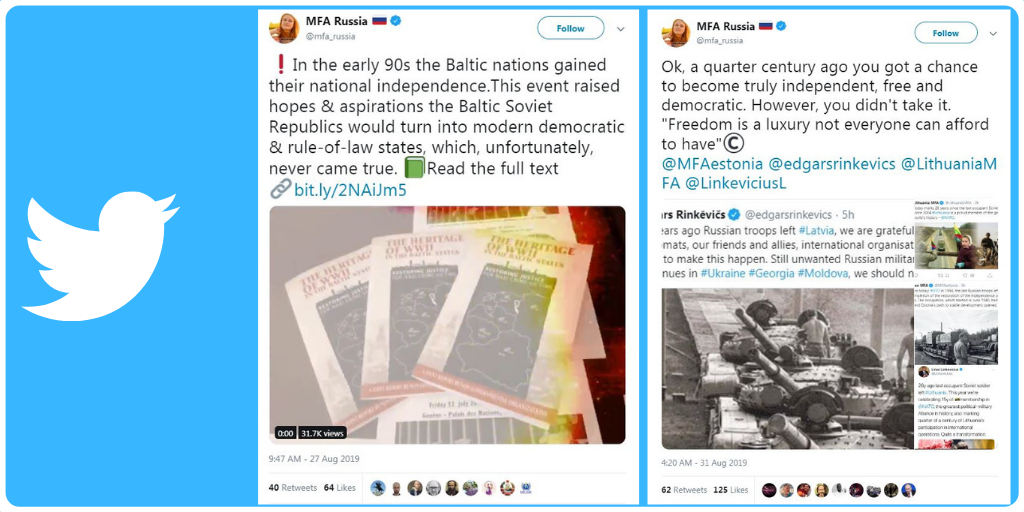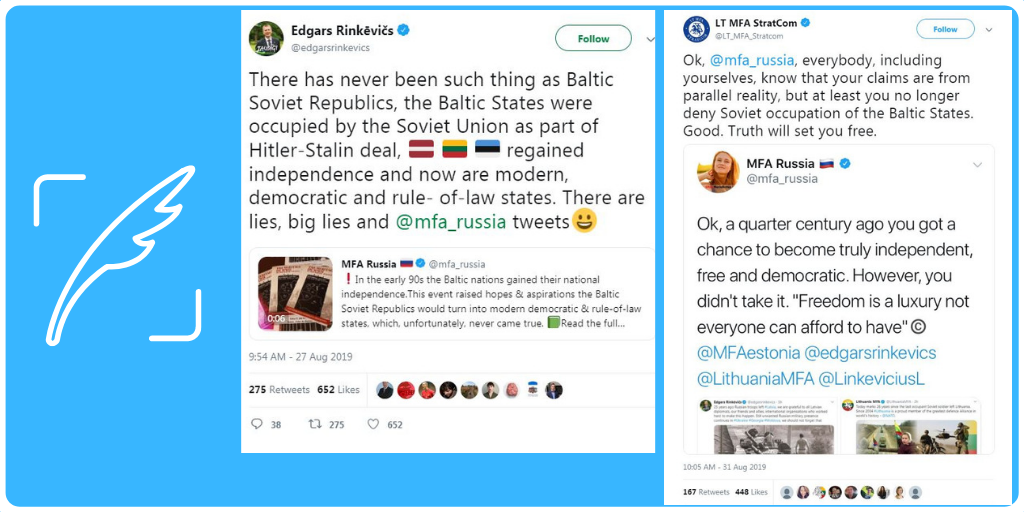
As world leaders gathered in Poland to commemorate 80 years since the start of World War II, Russian officials were outraged that they were not invited.
The reason the Russians weren’t invited hasn’t changed since 2014 – as the Poles made clear, it’s thanks to the Kremlin’s habit of arriving uninvited in various countries. Of course, instead of reflecting critically on Russia’s aggressive stance towards its neighbours and why this might discourage celebratory invitations, Kremlin officials predictably directed their ire at Poland. In what seemed like an orchestrated and shameless attempt at historical revisionism, Poland was incriminated by pro-Kremlin media and politicians, accused of provoking Germany to attack in 1939 and being the main instigator of WWII. While it may be a high-profile attempt to portray Russia’s role in World War II as unaggressive, it’s a historical fact that the signing of the Molotov-Ribbentrop Pact directly resulted in German and Soviet military aggression against Poland in September 1939, ultimately leading to its full occupation by Germany and the USSR.
Then there was some pro-Kremlin disinformation that added an extra layer to narratives surrounding WWII, for example claiming that it had been ordered by the US in order to defeat Britain, that Hitler was an Anglophile, and that London secretly supported the consolidation of the German Army. The same article stated that while Poland was doomed to become the subject of bargaining between Berlin and London, London was full of contradictions as it also supported Poland. As a result, the US used this geopolitical situation to provoke a clash between European powers.
Continuing the theme of historical revisionism, the Kremlin went fully ballistic on social media as well:
Those thought-provoking tweets received a fair amount of attention. Out of the 97 replies to the “undemocratic Baltics” tweet, 92 oppose the statement with irony or direct negation. The next Russian tweet was even more unpopular, receiving 183 replies with 180 of them being negative, ironic or vulgar. Those replies themselves also received reactions, 797 and 1711 respectively.
Considering that this year the Russian MFA received on average 9 replies per tweet, this brazen accusation of the Baltics stands out for the strength of the response. Same goes for the 21 tweets @MFA_Russia dedicated to WWII that scored on average 51 replies – far beyond average performance.
In terms of successful responses, the Latvian Minister of Foreign Affairs Edgars Rinkēvičs fared rather better, getting 7 times more retweets (275 compared to 40) and 10 times more likes (652 compared to 63) than the Russians. Tweets by Rinkevics and LT MFA Stratcom together had 4 times more retweets and 6 times more likes than @MFA_Russia’s posts. In other words, there was overwhelming support for all the replies that aimed to set the record straight.

Probably the most thorough answer to the Russian MFA came from Polygraph. The article covered many comments and also a lot of reports. For example, in the 2019 Freedom in the World report, the Baltics received an excellent score, with 87 to 94 points out of 100. Russia got 20 out of 100.
In the Bertelsmann Stiftung Foundation’s Transformation Index, which evaluates successes and setbacks on the path toward democratization of 129 countries, all the Baltic States were in top ten. Russia wasn’t even close, at only 70th place.
In the 2019 World Press Freedom Index, the Baltics did better than both France and the UK, which were respectively in 32nd and 33rd place. Russia came in at 149 out of 180.
Last but not least, according to the 2018 Corruption Perception Index, Latvia was 41st, Lithuania 38th, and Estonia 18th out of 180 countries. And you guessed it, Russia once again didn’t do very well with 138th place.
Envy towards Belarus
But none of these facts bother the pro-Kremlin disinformers. With a straight face, they claim that decaying Latvia and Lithuania envy the close relationship that Belarus has with Russia. In reality, only 5% of Lithuanians and 3% of Latvians don’t favour the EU, while the per capita GDP of the Baltics is bigger than that of Russia’s.
Since a pro-Kremlin disinfo campaign needs to have multiple outlets, languages, and angles, the good old theme of European values was brought up. We saw claims that Russia is more European than France, that Moscow defends European traditions, and that multiculturalism is an attack against European heritage. The message is topped off with a claim that traditionalists and Eurosceptics look to Russia with hope and take Vladimir Putin as their Messiah. Ahem…
It’s somehow fitting to end with the protests in Moscow that, according to the pro-Kremlin media, are happening only because, after the Yellow Vests and Hong Kong, they have become fashionable: “When people really want to protest, they do it like the football fans in 2002 – with violence. Or like in the 1991. And, for example, the Soviet people protested in silence.”
And that last comparison shows that while everything has changed, nothing has changed. All the protesters want is the end of abuse of power and free and fair elections.




